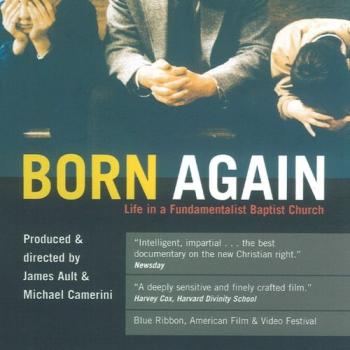Earlier (some months ago now) I posted an essay here arguing for a Protestant version of purgatory. (Hold your fire unless you’ve read that post!)
Now I’d like to argue for a Protestant version of categories of sin–something like the Catholic categories of mortal and venial.
Recently someone commenting here repeated the Protestant cliche that all sins are equal. I think that is folk religion UNLESS it has been reflected on critically and a strong biblical case made for it. Far too many Protestants simply mindlessly repeat it having no idea that it conflicts with scripture, tradition, reason and experience.
Now, IF all it means is that all sins (like sinfulness itself!) offend God and harm (if not destroy) relationship with God…fine. We could easily transfer that to human experience and say that every little act of selfishness harms any relationship. But we also know from experience that, in a relationship of love, not every act of selfishness equally harms the relationship.
So what is my biblical evidence for this distinction between sins that can destroy a relationship with God (at least in this life if not in the next) and sins that harm but do not destroy it? Romans 14:23 says that whatever is not done with faith is sin. Can anyone claim he or she always does everything with faith? What about sins of ignorance and omission? Jesus talked about a sin that is unforgiveable. 1 John 5:14-17 talks about sins that are mortal and sins that are not mortal. This distinction appears throughout Christian history–even in the Protestant Reformation. But Protestants have generally relegated “mortal sin” to the one “unforgivable” sin.
I would like to suggest that this Protestant tradition (and the cliche that expresses it in folk religious style) is simply an over reaction to Catholicism. In fact, something LIKE the Catholic distinction between mortal and venial sins makes a lot of sense–biblically, rationally and experientially.
IF we say that all sins are equal, even “in God’s sight,” then we have to say that kidnapping, raping and murdering a little child is on the same level as telling someone their new hair style is becoming when it isn’t. That just doesn’t make sense. Sure, of course, both child murder and the “little white lie” offend God but surely not equally!
Let’s apply a little mind experiment to test this. Suppose a true Christian–a saved person–gives into an awful impulse and rapes and murders a child and does NOT repent of it. Then suppose another real Christian–a saved person–gives in to the temptation to deceive a co-worker with a hideous new hair style by saying “It’s so pretty” and does NOT repent of it (for whatever reason but for the sake of argument let’s say she forgets about it).
Do both sins equally break the persons’ relationships with God? (Let’s not get into a debate about “once saved, always saved” over this. For now, in this context, I am simply asking whether both sins equally damage a person’s fellowship with God in this life.) Will God equally withdraw his blessing from each person? Will communion with God be damaged equally by both sins not repented of? I think that’s ludicrous–to think so.
I remember these debates in church youth group and in Sunday School–many years ago. We were told by some of our mentors that every little sin, including a “little white lie,” breaks off your relationship with God until you repent of it. But we were also told (sometimes by the same mentor!) that the condition of “sinfulness” causes everyone to commit sins of omission and ignorance but these are “covered” by the “blood of Jesus” so that they do not break off fellowship with God or God’s blessing. (Although we were also always encouraged to ask God’s forgiveness in “blanket style”–for all our sins known and unknown to us.)
What is that but something LIKE the Catholic doctrine of mortal versus venial sins? And yet, our mentors would ALSO say “All sins are equal.” I remember struggling with these contradictions but being afraid to point them out or ask for clarification. Then–during my years in a fundamentalist Bible college I DID ask about them and was harshly criticized for doing so!
So what would a Protestant version of categorizations of sin look like? I see no problem with borrowing the terminology “mortal” and “venial” sin from Catholic theology, but I know many especially evangelical Protestants will choke on those words EVEN IF they agree that not all sins are equal in terms of damaging our relationship with God. However, I haven’t come up with alternative single words for the two categories. Do we necessarily need them?
I suggest we teach our people that there are sins that damage and even break off one’s personal relationship with God and that SHOULD result in church discipline if discovered–unless the person repents. Some of them should result in the committer being barred from some levels of leadership for a time of restoration. (The fact that many Protestant denominations and churches already so this supports my contention that most Protestants really do NOT believe “all sins are equal!”) Then there are sins that do NOT break off a saved person’s relationship with God even if no specific repentance follows. We don’t have to say these are harmless or unimportant; we can say that if they become practice and a part of a person’s lifestyle they CAN add up to serious sin that harms or even breaks off the relationship with God.
In my book Questions to All Your Answers I have a chapter on this issue and I use an example from my own family history. I recall that occasionally a letter would arrive not postmarked so that the stamp could be cut off the envelope and re-used. My father insisted it was okay to do that. My stepmother insisted it was sin to do that. My brother and I listened with some amusement (but also confusion) to their discussions about this. Now, one of my parents was right and the other one was wrong. But let’s say my stepmother was right and, in God’s sight, re-using the stamp was a sin. Did re-using one break my father’s relationship with God? I can’t imagine it. Years later he was caught embezzling from his church. Did that break off his relationship with God? (I’m not talking about the being caught but the first willful, conscious, presumptuous theft he did not repent of.) I think so–unless and until he repented.
Now, was there some connection between my father’s re-using a stamp and his later embezzling from his church? Perhaps. But that doesn’t make them equal! What it means is that even those things we think are not sin but MAY BE should be carefully considered and avoided if possible–but not to the point of scrupulosity about everything (like Luther’s spending hours in confession confessing every thought that might possibly be sinful until his confessor told him to go away and not come back until he had something really sinful to repent of!).
In short, I think “all sins are equal” is simply a cliche. We should drop it–and challenge it when overheard. It doesn’t make any sense–biblically, in terms of the Great Tradition, rationally or experientially.















